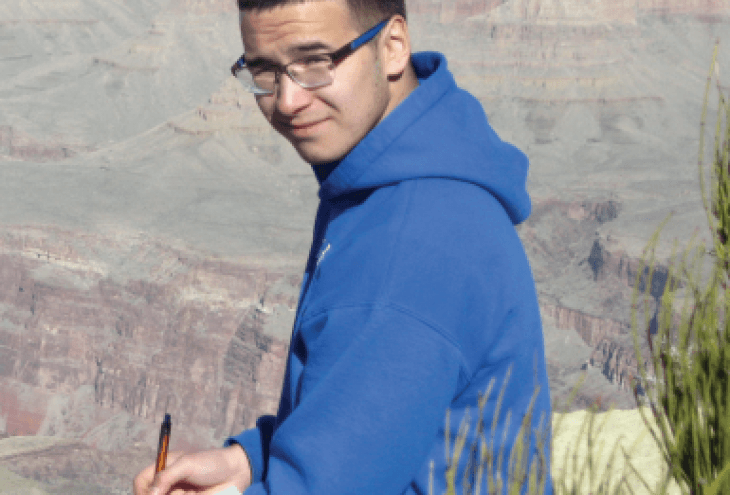As a child living in a remote village in western Alaska, Kory Morris Francis Joe was enthralled by the stars. Stargazing was a therapeutic pastime for Joe, who would stare up at the night sky to distract himself from the alcoholism that plagued his family, and so many others, in his rural community. Today Joe, Yupik Eskimo and Asa’carsarmiut Tribe, is studying at Northern Arizona University to become a mechanical engineer in a space program. He uses his past as motivation for the future. “I love how the stars momentarily take my mind away, and that’s what inspired me to shoot for them in a space program,” Joe says. “As a kid, I didn’t know what path to take, as I wasn’t exposed to opportunities outside my rural community. But I did know that the best place to start was through education.”
Leaving Home
Joe credits his close-knit family with encouraging him to seek opportunities outside his hometown of Mountain Village. His mother, uncle, and eighth-grade teacher introduced him to Mount Edgecumbe High School (MEHS), a boarding school in Sitka, Alaska — more than 1,000 miles from home. “Ultimately it was my grandma who influenced me to attend MEHS,” Joe explains. “She told me it would be the best choice for my future.” At MEHS Joe realized that working in a space program was a realistic goal. His math and physics teachers introduced him to mechanical engineering during his junior year, and Joe was immediately hooked. “I got truly interested in mechanical engineering through my desire to help my Yupik Eskimo people,” he says. That desire motivated Joe to pursue his dream career from a young age. He took advantage of every opportunity, graduating from MEHS in 2013 as class valedictorian. He also won a Gates Millennium Scholars scholarship, an award funded by a grant from the Bill and Melinda Gates Foundation to provide outstanding minority students with funds for college.
Overcoming Obstacles
Even with the scholarship in hand and an acceptance to the University of Alaska Fairbanks, Joe still faced one huge obstacle in his path to college: getting there. Mountain Village — population 813 — is, as Joe puts it, “totally off the grid.” The only way to and from the village is via costly bush planes. “I almost couldn’t afford to travel to college, as my scholarship didn’t pay for it,” he explains. He managed to make it work, but those expensive trips back to Mountain Village were few and far between. These days, as a student at Northern Arizona University — where Joe transferred after two years at Fairbanks — he visits home just once a year, if at all. Despite this, Joe says, “I’m truly grateful for how far I’ve come.” His accomplishments since attending college include two enviable internships. The first, at BP Alaska, exposed him to the typical workday of a mechanical engineer. The second, a Boeing internship he landed through AISES, developed his mechanical engineering skills and forged lasting professional connections. “There was never a dull day at work,” Joe says of the internships.
Remembering Roots
As Joe looks toward a bright future — including an upcoming summer internship with the Boeing Space Program in New Orleans — he remains focused on where he came from. “Rural Alaska is my homeland,” he says. “I love my people.” But, Joe notes, Alaska Natives face many challenging problems today. In particular, he points to Alaska’s suicide rate, the highest in the country per capita — and Alaska Native men ages 15–24 have the highest rate of suicide of any demographic in the United States. “They’re losing hope,” Joe says, “just as I’ve lost hope before.” Joe overcame his own depression with the help of others. Now, he hopes to give back. “The problems I’ve experienced firsthand inspired me to help my Yupik people as, hopefully, an inspiration — and in the future, as an advocate for a better life in rural Alaska,” he says. “It’s going to take time, but I believe that through AISES I can achieve this goal.”












